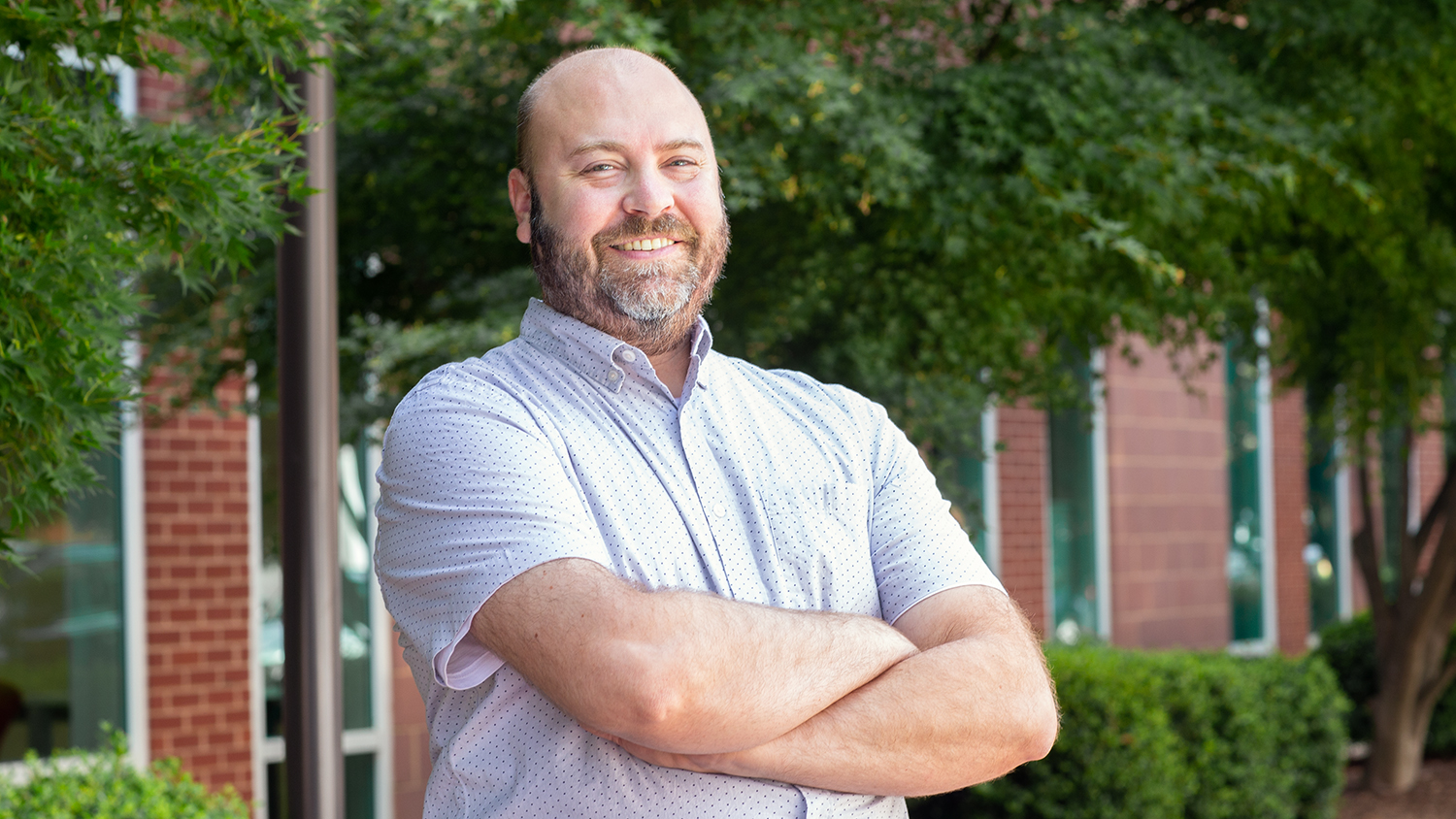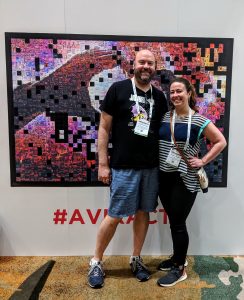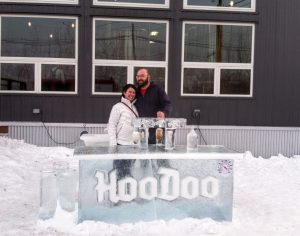Inside DELTA: 5 Questions with Brandon Joyner

As a technology support technician for Video Communication Services (VCS) at DELTA, Brandon Joyner is in his element, combining passions for where he works and what he does.
Raised in Rocky Mount, North Carolina, Joyner’s lived in the Tarheel State his whole life, and he plans to keep it that way. While some complain about North Carolina’s humid and oftentimes erratic climate, he takes pleasure in hot summers and unpredictable winters that bring both snow and sunshine, sometimes during the same week. For him, working at NC State feels like coming home.
In fact, he’s returning to his alma mater each day of the week. Joyner studied film studies and communication at NC State after spending 10 years as an electrical supplies salesman. He packed his time in school with extracurriculars that allowed him to cultivate his expertise in live broadcasting.
“In a live broadcast, you need someone running audio, you need camera operators, you need someone filling in graphics when the time is right, you need a director, and that’s what we do at DELTA –– everything.”
Joyner developed a taste for the discipline while working for NC State University Athletics, live streaming sporting events such as football, baseball and basketball games on the GoPack website. He continued to live stream as an intern for the Carolina Hurricanes, and went on to work for Raleigh’s local news station, WRAL.
In the past four years working at DELTA, he’s found a community of people in VCS who share similar experiences and a love for what they do, which he describes as his favorite part of the job.
“Most of the people in our department, the job they had before this was in news broadcasting, so we all come from the same kind of background. A lot of the people I work with also went to the same program, film studies at NC State. Through the decades, we’ve had the same professors and loved the same kind of stuff. It takes a special person to do live broadcasting; getting to sit and hang out with them all day while we do our job and talk about the shared interest that we have is really cool.”
How would you describe your position to someone unfamiliar with DELTA?
“The main thing that we do is record in-person lectures for online students to view.” This role is composed of three important responsibilities: recording lectures, monitoring key technologies, and assisting and instructing faculty members.
The procedures behind recording a lecture might sound like science fiction to someone who’s unacquainted.
“We’re in our central control room over on Main Campus. It’s basically a room with a bunch of giant monitors and what we call ‘pods.’ You can sit and control [classrooms] from a distance. We have robotic cameras, we have control of all the microphones, we can see everything, hear everything. We also have a person on-site to work with the professor.”
These recordings are facilitated by 10 distance learning classrooms across campus. With all the technologies they house comes a lot of room for error. Fortunately, the technology support team has best practices in place to make sure they’re ready for whatever challenges arise. In addition to technicians stationed in each classroom, the engineering department is on-hand to address whatever needs fixing.
“With live broadcasting, you always have to have a work-around, and you have to always have a backup. That’s the tricky part of the job, knowing when not to panic and how to keep your head on straight and jump to your backup.”
Thanks to the team’s careful planning before each lecture, faculty members never have to worry about technical difficulties or uncertainties. Instead, they can focus on the lesson and their students. Though students may not always notice Joyner’s work behind-the-scenes, that’s the goal. He makes sure to prioritize their time in every class and keep them focused on what’s important.
“When you’re recording an in-person lecture, you have all of the students in the room –– their time is valuable. The professor’s time is valuable, and they only have an hour and 15 minutes. The idea is to be really quick and keep everything flowing.”
What are your day-to-day responsibilities?
“The first thing we do is set up the classrooms, making sure that everything is working,” says Joyner. “We start 30 minutes before the class starts, checking all the cameras, microphones and computers. We make sure there is nothing that’s going to be a surprise when the professor walks into the room.”
Throughout the semester, Joyner and the team get familiar with instructors and their personal preferences when it comes to teaching a class, even things as specific as the height they like their desk to be. With their help, all the instructor has to do is walk in and begin the lesson.
In addition to instructors, Joyner makes sure that students and guest speakers feel comfortable coming to class. He gets to know the people in each course –– who likes to talk and who doesn’t. By making these observations, he can prepare the cameras and microphones to record their contributions.
Sometimes, students take the class from remote locations, and Joyner has to ensure that their real-time experience is just as interactive and engaging as it would be in person.
“That’s the idea –– make an online student feel like they are an in-person student,” he explains.
He has to think outside the box to capture digital technologies, presentations, projections and displays. If a physical tool is passed around the room, he asks questions like, “How can a person who can’t touch it still experience it?”
With these strategies, Joyner works to bridge online and in-person experiences and put himself in the mind of an online student.
“Advocate for online students –– that’s what I see my job as ultimately. It’s a person who can’t be there, so while the lecture is going on, I have to think ‘If I was taking this class, would I be learning right now? Am I recording this class in a way that’s helpful to the student?'”
In many ways, he acts as a voice for online students, making sure that instructors adapt their teaching strategies to online learning and that students receive all the resources they need to be successful. That means uploading the lecture within five minutes of the class ending and maintaining precise focus, even when he’s recording two classes at once.
Along the way, Joyner learns a lot himself. “There’s so many things that I never thought I would get to learn about from recording these classes. Hindi, Urdu language –– I got to pick up some of that. I never thought that I would do that.”
What has been your favorite experience at DELTA?
“My favorite experience has been this conference that we get to go to called InfoComm. It’s every June, and I went two years ago in Orlando.”

InfoComm consists of unique chances to learn new things and experience the latest audio-visual technologies. Joyner was able to network and share ideas with professionals throughout the audio-visual industry, especially those from higher education. He will return to the conference this year with the technical support team at DELTA.
“The first three days are intensive audio-visual classes. The rest of the week is a giant exposition with all kinds of manufacturers, people that everyone’s heard of –– Sony, Panasonic, Canon –– but also people you’ve never heard of that do all kinds of interesting things. It’s a giant convention center packed with every kind of audio-visual gadget that you can think of.”
The conference also presents a wonderful opportunity for professional development.
“I took classes [at the conference] to prepare for the Certified Technology Specialist (CTS) test.” CTS certification represents profound competency in the audio-visual discipline and is a common job requirement in the field.
“A few months later, I took the CTS test and got my certification. It was really cool because it was something that I had already been looking into before I got hired at DELTA. When I got hired, they said one of the job perks is that we go to InfoComm and take the test and classes. This is something I’ve been wanting to do for a few years now, so it was really exciting to find out that I can do this as part of my job.”
What do you like to do outside of work?
Joyner and his wife, Melissa, love to travel and explore new restaurants.

“My wife is a pastry chef. She’s an instructor at Wake Tech in their Baking and Pastry Art division. She has also worked at restaurants all around [the Triangle] as a pastry chef.”
Whether they’re checking out a new restaurant close to home or traveling overseas, their shared love for trying new food takes them to incredible places.
“Everywhere we go, the whole point is to find the best restaurants to see what the food scene is like there.”
“One of the best places we’ve ever eaten is this place in Lisbon, Portugal. It was a little tapas restaurant in the old town in Lisbon with hundreds-of-year-old buildings all around. It was a tiny family restaurant, and it was amazing.”
His wife’s culinary background also leads to great connections with other chefs, which can turn into lasting friendships.
“We usually end up talking to the chef, seeing the kitchen and getting to know them. We’ve made a great friend from going to an Italian restaurant in Charlotte called Stagioni. We got to know the chef there. Since he started working there, we’ve gotten to follow him from restaurant to restaurant. It’s cool getting to do that kind of thing.”
Their next stop? Orlando. Between days at InfoComm, the two will explore the city and the food it has to offer.
What is something about yourself people may not readily know?
“I was a non-traditional student. I went back to school in my early 30s. Going from a full-time working adult to going back to school, I relied heavily on online classes and distance education.”
After Joyner transitioned from a part-time to a full-time student, he continued to take classes online, not only because it helped him complete his degree faster, but because he truly enjoyed the experience. He believes online learning and organizations like DELTA have the power to make a transformative difference.
“There’s someone in Africa taking engineering classes that I’m recording. They’re going to end up with a degree, and they’re going to help their community. We’re improving that person’s life, but also improving where they are. They’re going to take that degree and use it to help people around them.”
Joyner knows first-hand of the hard work it takes to revisit higher education and the ways it pays off.
“The hardest thing I ever did was go back to school. I always say if you’re thinking about going back to school, just do it and don’t stop. It really does help change and improve people’s lives. That’s what we provide at DELTA as a whole. We give people a chance to improve their life. Not just people in North Carolina, people all over the world.”

- Categories:


